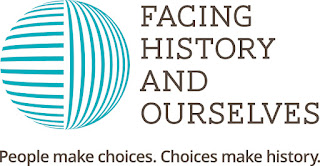Reflection to Action: “Choosing to Participate” Across the Curriculum
By Sue Khalaieff, Democracy School Network Manager
(Linked resources, courtesy of Ken C. Garcia-Gonzales and Sarah Shields)
The third session of the Civics Across the Curriculum webinar series was held on Thursday, January 21, 2021. This year’s theme builds on the theme from the originally scheduled Democracy Schools Network Spring 2020 convening, “Every Teacher is a Civics Teacher: Best Practices for Civic Learning and Organizational Supports.”
The program facilitated by Ken Garcia-Gonzales, Program Associate, and Sarah Shields, Senior Program Associate, from Facing History and Ourselves. The presenters spoke about Facing History’s pedagogical approach to civics, shared resources for classroom use, and gave participants an opportunity to reflect on a lesson analyzing levers of power. Using Facing History’s “Choosing to Participate” Toolkit, From Reflection to Action, participants explored several important themes: the importance of identity in civic life, the role of power and privilege, the empowerment of students, and the intersection of identity, community and civic participation. The Facing History approach prods students to think deeply about their individual identity, reflect on the implications of that identity in how they connect to community, and ultimately—make the choice to take action.
This pedagogy explores topics and case studies grounded in history, to explore themes such as freedom, justice, equality, and truth. Teachers from all areas of the curriculum can utilize the Educator Resources that are offered by Facing History and Ourselves. Here are a few examples: students in an English course can explore the connection between identity and dignity from a journal entry of a Holocaust survivor; a Science teacher might encourage students to reflect on the concept of the common good during a pandemic; Art students could consider art as a tool for social change, as demonstrated in the Black Lives Matter movement.
Facing History's approach to social, emotional, and academic development transcends the teaching of civics and social studies classes alone. Students are at the center of Facing History's pedagogy, in classrooms that honor diverse learning styles and are rooted in cultures of respect for all members of the community. Students experience the greatest success in classes, regardless of the subject, where they feel a sense of belonging that honors their identity, a sense of efficacy that is impacted by their effort, and a sense of empowerment that is recognized by their teachers.
We look forward to our continuing series on the first and third Thursday of the month from 4-5 pm on Zoom. Hope to see you at future webinars.





Comments
Post a Comment